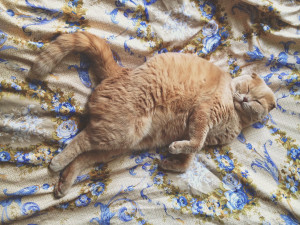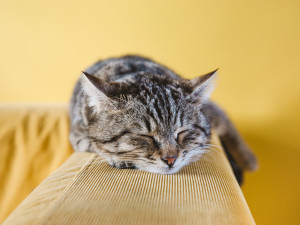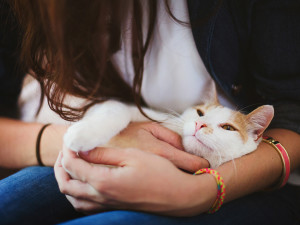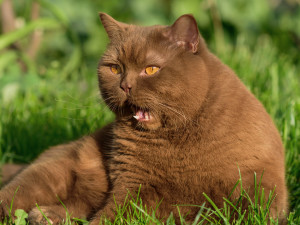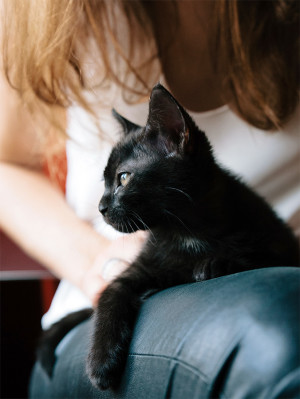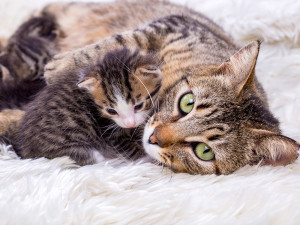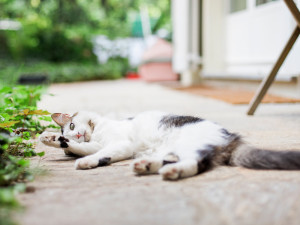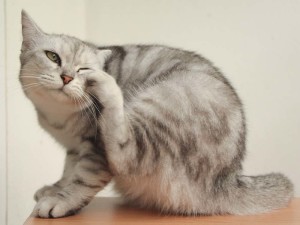Why Does My Cat Have a Primordial Pouch?
A low-swinging belly is totally normal in cats and isn’t usually a cause for concern. So, don’t let your kitty feel ashamed – they’re perfect just as they are
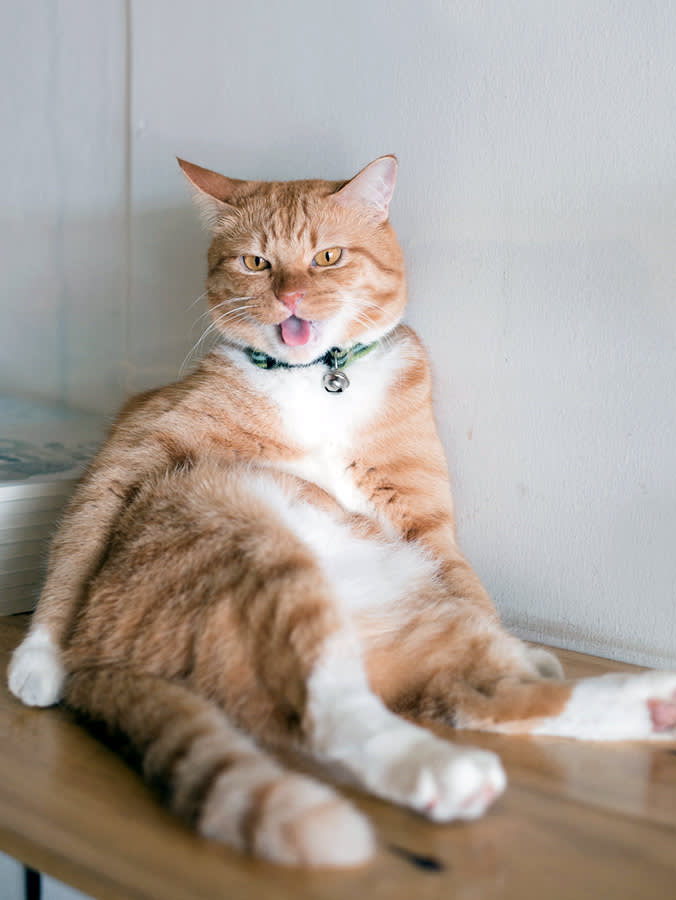
Share Article
Have you ever caught sight of your cat wandering along and suddenly noticed part of their belly is swinging side to side, perhaps even so low that it almost sweeps the floor? No, they haven’t got a spare tyre and (usually) nothing is wrong. That fine piece of extra chonk they’re sporting is just their primordial pouch.
Why do cats have a primordial pouch?
The ‘pooch’, the ‘extra belly’, or, to refer to it by its actual name – the primordial pouch – is a flap of skin and tissue just in front of the hind legs of a cat on their abdomen. Despite being extremely prevalent, it’s not actually known for certain why some cats get this extra scruff of skin. There are however, some theories on its benefits and why primordial pouches developed.
Protection: cats get into a lot of scraps and often use fighting tactics of kicking the opponent with their hind legs into their soft abdomens. This extra layer of skin and fat sits right over important organs and otherwise very delicate skin and so offers another layer of armour.
Flexibility: this pouch of extra skin sits in front of the back legs and may help allow the cat’s hindquarters to stretch out more when running and jumping.
Fat deposits: in order to survive, animals need a way to store energy, and the pouch provides a good storage space for fat if needed.
Do all cats have a primordial pouch?
All cats can have a primordial pouch including larger cats such as the lions and tigers. But not all develop them, and some have bigger pouches than others. Things that can affect the pouch’s size are the cat's breed, age and body condition. There is a genetic component that helps determine the size so some breeds are more likely to develop a bigger one than others, in particular, Bengal cats, Pixibobs and Egyptian Mau cats. The skin’s elasticity changes as cats age, similar to ourselves, and so older cats tend to have bigger pouches due to good old gravity.
Do dogs have a primordial pouch?
Nope! Cats alone get this extra fluffy scruff on their bellies.
When do cats develop a primordial pouch?
Cats usually develop their pouches at the start of adolescence, which is typically around five to seven months old. As this is roughly the time when most cats get neutered, it has led to a misconception that neutering is a cause of primordial pouch development, but this is not true. If your kitty is meant to have a pouch they will have one, neutered or not. Some cats only have a small amount of extra skin at first and then as they age it can develop further.
Do male cats have a primordial pouch?
All genders of cat may or may not develop a pouch, it doesn’t matter if your cat is male or female.
Can a primordial pouch be too big?
The pouch itself isn’t a problem, all it is is extra skin and another area to store energy in the form of fat. What can become a problem is if your cat becomes too overweight and too much fat is stored here so they can’t do their normal contortionist act to groom themselves. This can also happen in their golden years if they develop arthritis or other injuries they've gathered throughout their lives start taking their toll. Always keep an eye around the belly for any matted sections or signs of reduced grooming. If you are worried they have reduced their normal grooming it is always best to make an appointment with your vet to check for any health issues that may be causing it.
How do I know the difference between an overweight cat and a primordial pouch?
It can be alarming noticing a swinging belly and wondering how to tell the difference between a primordial pouch and your cat being overweight, so here are some tips to see the differences. Instead of exact weights being the measure of obesity in animals, vets use an animal version of the Body Mass Index (BMI). This is called the Body Condition Score and ranges from 1–9, with 1 being too low, 5 being ideal and 9 being too high. Being near either extreme score is risky for your cat’s health and can make them more susceptible to health conditions. To be at an ideal ‘5’ when looking at your cat from the side, we shouldn’t see ribs but want to be able to feel them if stroked, their abdomen should tuck up towards hind legs and they should have a defined waist if viewed from above. We want to be able to feel some fat around the ribs, hips and spine. A primordial pouch will swing easily when walking whereas excess fat in the abdomen will not.
How do I know the difference between a pregnant cat and a primordial pouch?
Another concern you may have when you spot a pooch developing is whether your cat is pregnant. Queens (female cats) can show their pregnancy at about five weeks gestation, and take eight to nine weeks in total. They can look rounder from the side and from above just behind their ribs, and their nipples can start to become more prominent and pinker. It is best not to try to feel for kittens as this can cause damage if not performed properly. Call your vet if you are concerned your cat may be pregnant, especially if your cat is young themselves. Your vet will be able to give you the best advice for your pet.
A primordial pouch is not in any way a bad thing. In fact, it’s even within some breed conformation standards in cat shows! As long as your cat’s Body Condition Score is appropriate and they can still groom themselves there is no need to worry about them, it’s just more of your cat to love.
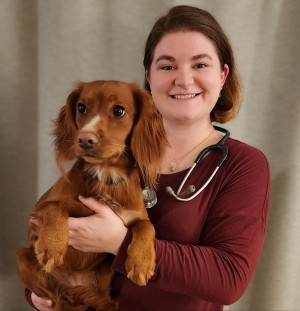
Dr Josephine Corrick, BVMSci, BSc, MRCVS
Dr Josephine Corrick, BVMSci, BSc, MRCVS is a veterinary surgeon based in the south of Scotland where she has been since graduating from the University of Surrey. She enjoys working in general practice treating small animals. Her particular interests include diagnostic imaging and the treatment of wildlife.
Having found a passion for veterinary medicine after doing a degree in Equine Sports Science she still enjoys including horses in her life by spending time with her highland ponies. Alongside her clinical work, she helps run a smallholding caring for rare breed sheep and exploring the Scottish countryside with her young Cocker Spaniel.
Related articles
![Cat napping on a yellow couch against a yellow background]()
Does My Cat Have Spots?
Pimples and spots can be unsightly and painful – here’s how to treat your cat’s acne
![Cat enjoying laying on girl's legs and being cuddled]()
Claws Out: How to Trim Your Cat’s Nails
Expert tips and the best tools for getting the job done without a scratch
![brown cat in grass]()
Hairballs: A Tangled Web
What to do when your cat hawks one up
![side profile of black kitten sitting on a woman's lap]()
Henry’s Pocket – The Weird Flap Of Skin On Your Cat’s Ear
Has your cat injured themselves? Are they growing themselves an extra ear? Nope, it’s far more likely you’ve just stumbled across Henry’s Pocket
![Mom cat and her kittens.]()
How to Tell if a Cat is Pregnant
Are kittens on the way? Here’s how to find out
![Siberian cat licking her paw outdoors.]()
What to Know About Tapeworms in Cats
What to look for and how to treat it (to be able to eat rice again)
![Gray and white striped cat is scratching his ear]()
What’s Up With My Cat’s Skin?
Everything you need to know about cat allergies, according to three veterinary dermatologists

